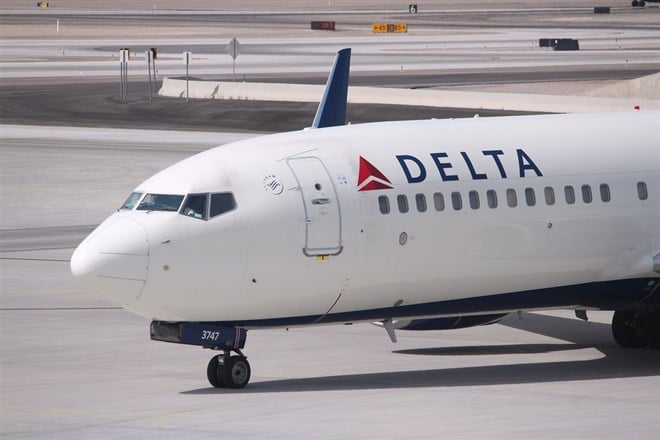
Even as business travel remains well below pre-pandemic levels, U.S. air carriers, including Delta Air Lines Inc. (NYSE: DAL) are showing a renewed lift in the past month.
While leisure travel is taking up some of the slack from the decline in business trips, airlines see their revenue and earnings return with a vengeance.
Delta has grown earnings between 235% and 573% in the past three quarters. Revenue increased at rates between 125% and 42% during that time.
The airline industry is complicated, competitive, highly regulated, and always under consumers’ and politicians’ microscopes. On February 7, the company said it would raise employees’ wages by 5% as they face a worker shortage amid increased travel demand.
Also, on February 7, the company said it opened a new facility to repair Pratt & Whitney engines. The new facility is part of an effort to increase revenue in Delta’s maintenance, repair, and overhaul business segment. Delta plans to service engines not only for its fleet but also for other airlines.
The stock is up 10% in the past month and 21% in the past three months.
It began forming a cup-with-handle base in late April, with a buy point above $39.62. Shares closed at $39.59 on February 7, meaning the stock remains in the buy range. A decline of a few pennies beneath a buy point is essentially a non-event, but investors should monitor if the stock falls further and the breakout breaks down.
Industry's Best Price Performer
Delta’s breakout is still in play, but it’s not even the best 12-month price performer within the airline industry. That honor goes to Panamanian airline Copa Holdings SA (NYSE: CPA), which boasts a one-year gain of 12.80%. It’s up 8.30% in the past month and 20.03 in the past three months.
The stock has a market capitalization of $3.66 billion, so it’s at the lower end of what’s considered a mid-cap.
While this may not be a familiar name to U.S. travelers, Wall Street thinks highly of the company. MarketBeat analyst data for Copa show a “buy” rating on the stock, with a price target of $111.80, representing a potential upside of 20.25%.
After the market's close, Copa is slated to report its fourth quarter on February 15. Wall Street expects earnings of $4.27 a share on revenue of $889.15 million, which would mark significant year-over-year increases.
Copa’s chart shows that it cleared a cup-with-handle base on January 13 in more than double the normal trading volume.
For investors who prefer to focus on U.S. carriers, United Airlines Holdings Inc. (NASDAQ: UAL) is up 35.07% so far in 2023 and 18.92% in the past year.
MarketBeat earnings data show that United beat sales and earnings views in the past two quarters.
Industry Pros And Cons
Of course, with all airlines, the debt burden is something to consider, especially if you’re considering holding the stock for the long haul. United and Delta have exceptionally high debt-to-equity ratios. While that’s not necessarily a concern when investing in a growing revenue stock, the airline industry is among those most sensitive to economic conditions and so-called “black swan” or unpredictable events.
Taking that caveat into account, the airline industry may be worth a look at the moment because more consumer dollars are being directed into renting airplane seats, and analysts expect that trend to continue this year.
In a December report, the International Air Transport Association said it expects a return to profitability for the global airline industry this year as airlines continue cutting losses stemming from the pandemic travel restrictions. The trade organization anticipates a small net profit of $4.7 billion, the first annual profit since 2019 when industry-wide net profits were $26.4 billion.





